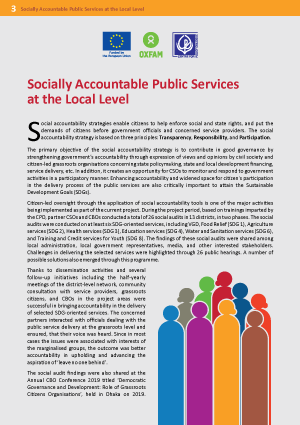 Social accountability strategies enable citizens to help enforce social and state rights, and put the demands of citizens before government officials and concerned service providers. The social accountability strategy is based on three principles: Transparency, Responsibility, and Participation. The primary objective of the social accountability strategy is to contribute in good governance by strengthening government’s accountability through expression of views and opinions by civil society and citizen-led grassroots organisations concerning state policymaking, state and local development financing, service delivery, etc. In addition, it creates an opportunity for CSOs to monitor and respond to government activities in a participatory manner. Enhancing accountability and widened space for citizen’s participation in the delivery process of the public services are also critically important to attain the Sustainable Development Goals (SDGs).
Social accountability strategies enable citizens to help enforce social and state rights, and put the demands of citizens before government officials and concerned service providers. The social accountability strategy is based on three principles: Transparency, Responsibility, and Participation. The primary objective of the social accountability strategy is to contribute in good governance by strengthening government’s accountability through expression of views and opinions by civil society and citizen-led grassroots organisations concerning state policymaking, state and local development financing, service delivery, etc. In addition, it creates an opportunity for CSOs to monitor and respond to government activities in a participatory manner. Enhancing accountability and widened space for citizen’s participation in the delivery process of the public services are also critically important to attain the Sustainable Development Goals (SDGs).

